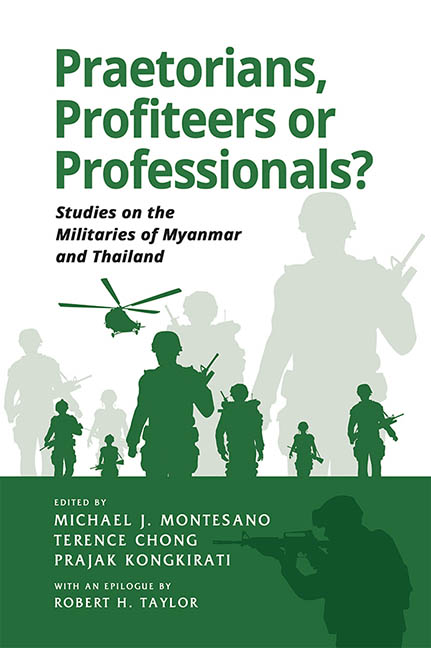Book contents
- Frontmatter
- Contents
- Acknowledgements
- About the Contributors
- 1 Introduction: Two Mainland Southeast Asian Militaries in Comparative Perspective
- 2 A New Tatmadaw with Old Characteristics
- 3 Thailand’s Military: Ideology and Sense of Mission
- 4 The Defence Expenditures and Commercial Interests of the Tatmadaw
- 5 The Economic Role of the Thai Military: A Commercial Logic to Coups?
- 6 Epilogue: Controlling or Playing Politics?
- Index
5 - The Economic Role of the Thai Military: A Commercial Logic to Coups?
Published online by Cambridge University Press: 09 October 2021
- Frontmatter
- Contents
- Acknowledgements
- About the Contributors
- 1 Introduction: Two Mainland Southeast Asian Militaries in Comparative Perspective
- 2 A New Tatmadaw with Old Characteristics
- 3 Thailand’s Military: Ideology and Sense of Mission
- 4 The Defence Expenditures and Commercial Interests of the Tatmadaw
- 5 The Economic Role of the Thai Military: A Commercial Logic to Coups?
- 6 Epilogue: Controlling or Playing Politics?
- Index
Summary
Since the replacement of Thailand's absolute monarchy with a constitutional regime in 1932, the country's armed forces have attempted coups d’état at the rate of one every four years. Two thirds of these attempts have been successful. The resultant military juntas have typically promulgated new regulations, laws and constitutions before holding elections or themselves falling victim to coups. These new rules and the changes that they have introduced suggest the role of the Thai military as a significant economic-policy maker. At the same time, the military is also a consumer and a producer of goods and services. In fact, the Thai military produces both services related to security and services with no relation to security.
The goal of this chapter is to document the role of the Thai military as producer of the latter, services with no relation to security. The chapter draws on publicly available information from the Bank of Thailand, the Department of Business Development of the Ministry of Commerce, the Royal Gazette (Ratchakitchanubeksa), the Stock Exchange of Thailand, and the country's Securities and Exchange Commission (Khanakammakan kamkap laksap lae talat laksap).
The chapter makes three arguments. First, the Thai military has produced a wide range of services unrelated to security for six decades. It directly provides services through, or holds shares in, companies in banking and asset management, facilities for banquets and recreation, real estate and hotels, and radio and television broadcasting. Second, banking, radio broadcasting and television broadcasting have been regulated by laws enacted during military regimes to maintain strict barriers to entry. The roles of the Thai military as both producer of services and policymaker are in this sense complementary. Finally, besides the military budget, the factors of production crucial to the military's involvement in services unrelated to security include bank deposits; capital raised on the Stock Exchange of Thailand, including that from foreign sources; substantial land holdings; and conscripts. The military has thus benefitted not only from financial globalization but also from access to effectively subsidized low-wage labour.
The chapter sheds light both on the production activities of the Thai military in service sectors unrelated to security and on its success in shaping regulations to favour its own businesses.
- Type
- Chapter
- Information
- Praetorians, Profiteers or Professionals?Studies on the Militaries of Myanmar and Thailand, pp. 132 - 149Publisher: ISEAS–Yusof Ishak InstitutePrint publication year: 2020



